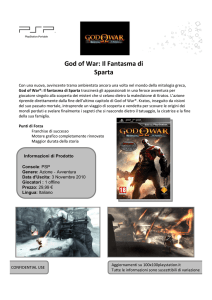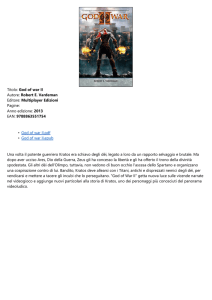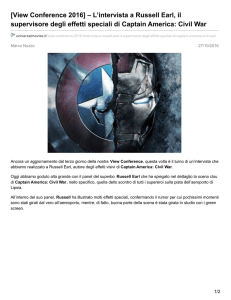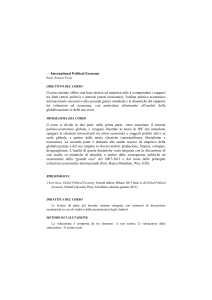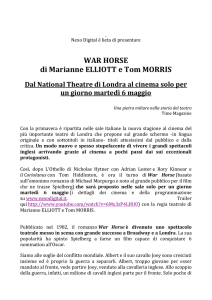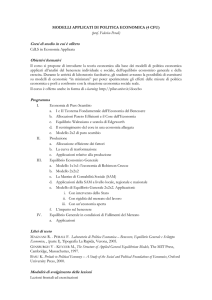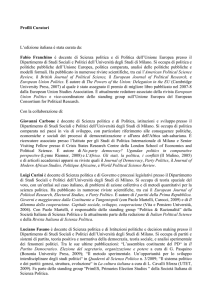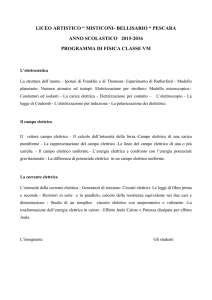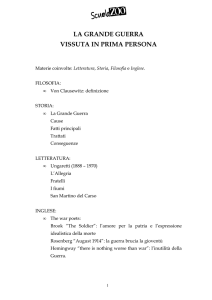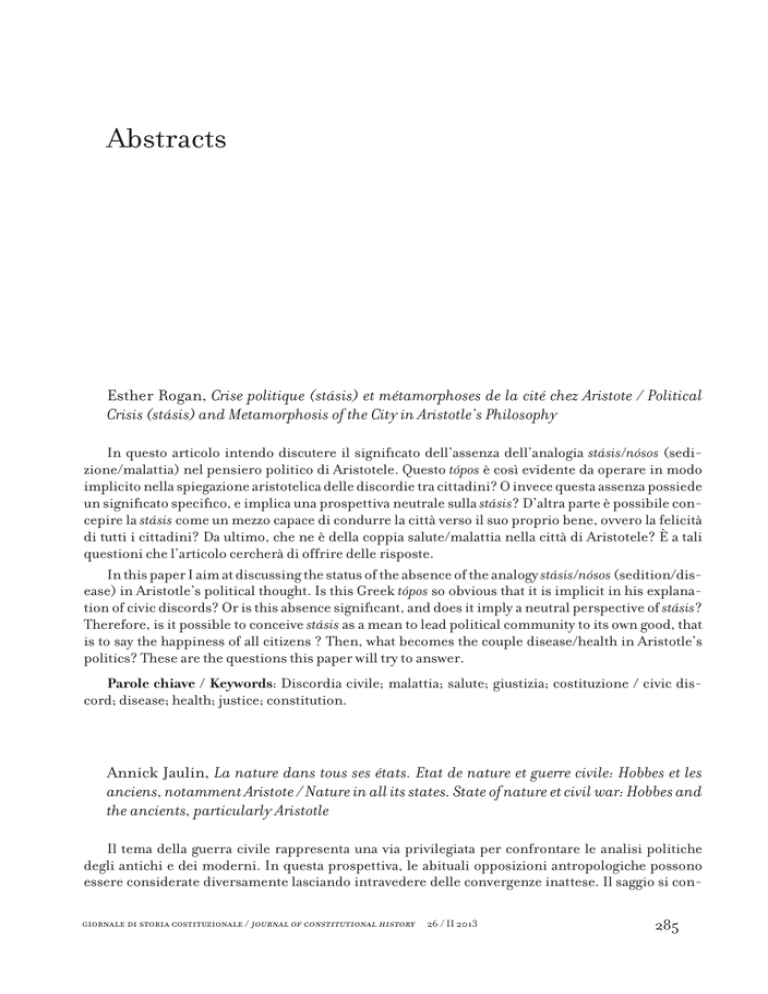
Abstracts
Esther Rogan, Crise politique (stásis) et métamorphoses de la cité chez Aristote / Political
Crisis (stásis) and Metamorphosis of the City in Aristotle’s Philosophy
In questo articolo intendo discutere il significato dell’assenza dell’analogia stásis/nósos (sedizione/malattia) nel pensiero politico di Aristotele. Questo tópos è così evidente da operare in modo
implicito nella spiegazione aristotelica delle discordie tra cittadini? O invece questa assenza possiede
un significato specifico, e implica una prospettiva neutrale sulla stásis? D’altra parte è possibile concepire la stásis come un mezzo capace di condurre la città verso il suo proprio bene, ovvero la felicità
di tutti i cittadini? Da ultimo, che ne è della coppia salute/malattia nella città di Aristotele? È a tali
questioni che l’articolo cercherà di offrire delle risposte.
In this paper I aim at discussing the status of the absence of the analogy stásis/nósos (sedition/disease) in Aristotle’s political thought. Is this Greek tópos so obvious that it is implicit in his explanation of civic discords? Or is this absence significant, and does it imply a neutral perspective of stásis?
Therefore, is it possible to conceive stásis as a mean to lead political community to its own good, that
is to say the happiness of all citizens ? Then, what becomes the couple disease/health in Aristotle’s
politics? These are the questions this paper will try to answer.
Parole chiave / Keywords: Discordia civile; malattia; salute; giustizia; costituzione / civic discord; disease; health; justice; constitution.
Annick Jaulin, La nature dans tous ses états. Etat de nature et guerre civile: Hobbes et les
anciens, notamment Aristote / Nature in all its states. State of nature et civil war: Hobbes and
the ancients, particularly Aristotle
Il tema della guerra civile rappresenta una via privilegiata per confrontare le analisi politiche
degli antichi e dei moderni. In questa prospettiva, le abituali opposizioni antropologiche possono
essere considerate diversamente lasciando intravedere delle convergenze inattese. Il saggio si congiornale di storia costituzionale / journal of constitutional history 26 / II 2013
285
Abstracts
centra sull’importanza assunta da Tucidide nella riflessione hobbesiana sulla guerra civile e, più in
generale, in tutta la sua antropologia. Si deve quindi rimettere in discussione, sotto questa angolazione, l’evidenza dell’opposizione tra l’opera di chi è considerato uno dei fondatori del pensiero politico
moderno e il pensiero politico degli antichi, almeno quando si tratta di filosofi dell’età classica, in
particolare Aristotele.
The theme of the civil war represents a privileged way of comparing the political analyses of the
ancients and of the moderns. In this perspective, the usual anthropological oppositions can be considered in a different way letting unexpected convergences be seen. The importance of Thucydides
for Hobbes’ reflection on civil war must be therefore underlined. We will also try to show that what
Hobbes owes to Thucydides concerns the whole of his anthropology. We must therefore discuss again,
taking this point of view, the facts of the opposition between the work of him who is considered to be
one of the founders of the modern political thought and the political thought of the ancients, at least
when we are dealing with philosophers of the classical age, particularly Aristotle.
Parole chiave / Keywords: moltitudine; potere sovrano; diritto naturale; animale politico; utile /
multitude; sovereign power; right of nature; political animal; utility.
Luca Scuccimarra, Combattere con le parole. Note sulla semantica della guerra civile nella
prima età moderna / Fighting with words. Notes on the semantics of the civil war in the early
modern period
Secondo Reinhart Koselleck, la classica nozione di «guerra civile» è uno dei «termini centrali»
attraverso il quale sono state articolate linguisticamente – e fissate giuridicamente – le «passioni e le
esperienze delle lotte animate dal fanatismo religioso» nel secolo dei terribili conflitti confessionali
«che devastarono successivamente e contemporaneamente la Francia, i Paesi Bassi, la Germania e
l’Inghilterra». Obiettivo del saggio è appunto quello di analizzare alcun passaggi-chiave nell’evoluzione storico-concettuale di questo segmento della moderna «semantica del conflitto», soffermandosi sui suoi più rilevanti esiti riflessivi e normativi nell’impianto categoriale dello ius naturae et
gentium sei-settecentesco.
According to Reinhart Koselleck, the classical notion of «civil war» is one of the «central terms»
through which «the suffering and experience of religious fanatical struggles» were linguistically articulated – and legally formulated – in the century of the terrible confessional confrontations «which
successively and simultaneously laid waste to France, the Netherlands, Germany, and England». Aim
of the essay is to analyze some key-moments in the conceptual-historical evolution of this segment
of the modern «semantics of conflict», reflecting on its more interesting reflexive and normative
outcomes in the category frame of the 16th and 17th century ius naturae et gentium.
Parole chiave / Keywords: guerra civile; conflitto; ius belli; giusnaturalismo / civil war, conflict,
ius belli, natural law theory.
Aurélie Knüfer, La “non-intervention” comme alternative à la “guerre civile européenne”:
une lecture croisée de John Stuart Mill, Benjamin Constant et Alphonse de Lamartine / The
“non-intervention” as alternative to the “European civil war”: an intertwined reading of
286
Abstracts
John Stuart Mill, Benjamin Constant and Alphonse de Lamartine
L’articolo vuole prendere in esame la genesi del “principio di non intervento”, con particolare
riguardo alla versione formulata nel 1859 da John Stuart Mill in “A Few Words on Non-intervention”. Esso esamina come il filosofo inglese abbia forgiato le sue argomentazioni grazie ad un dialogo fecondo con alcuni pensatori “liberali” del suo tempo, come Alphonse de Lamartine e Benjamin
Constant, e mostra come la loro interpretazione di alcuni conflitti avrebbe potuto rappresentare un
importante contributo per la discussione dell’intervento militare. Inoltre, il lavoro evidenzia come il
principio di “nonintervento” potrebbe paradossalmente essere per John Stuart Mill uno strumento
di liberazione di popoli oppressi oltreché una alternativa alla “guerra civile europea”.
The article aims at examining the genesis of the “principle of non-intervention”, with particular
reference to that formulated by John Stuart Mill in “A Few Words on Non-intervention” in 1859. It
examines how the English philosopher forged his arguments through a fruitful dialogue with some
“liberal” thinkers of his time, such as Alphonse de Lamartine and Benjamin Constant, and it shows
how their interpretation of some conflicts could have been a real issue for posing the question of military intervention. In addition, this work highlights how the principle of “non-intervention” could
paradoxically be an instrument of liberation of oppressed peoples, as well as an alternative to a “European civil war”, for John Stuart Mill.
Parole chiave / Keywords: Intervento militare; guerra; liberalismo; John Stuart Mill; Benjamin Constant; Alphonse de La Martine / Military intervention; war; liberalism; John Stuart Mill;
Benjamin Constant; Alphonse de La Martine.
Angelo Ventrone, Uomo, animale, cosa, polvere. La violenza contro il nemico politico in
prospettiva storica / Man, animal, thing, dust. The violence against the enemy in historical
perspective
Il saggio affronta la sovrapposizione tra la figura del nemico politico e quella del criminale nell’età contemporanea, e mette a confronto le modalità di repressione politica messe in atto in Europa nei
decenni che vanno dalla Comune di Parigi allo scoppio della Guerra Fredda.
The essay deals with the overlap between the figure of the political enemy and that of the criminal
in the contemporary age, and compares the methods of political repression enacted in Europe in the
period ranging from the Commune of Paris to the outbreak of the Cold War.
Parole chiave / Keywords: nemico; propaganda; violenza politica / political enemy; propaganda;
political violence.
Renato Moro, Guerra o operazione di polizia? La guerra civile nella storia dei movimenti per
la pace / War or Police Operation? Civil War in the History of Peace Movements
Nel XIX e XX secolo, mentre le guerre civili incarnavano, in una forma radicale, i caratteri fondamentali della guerra stessa, i movimenti pacifisti svilupparono un nuovo fenomeno, radicato nel-
287
Abstracts
la percezione della concreta possibilità di abolire la guerra. L’articolo prende in esame la reazione
dei movimenti pacifisti alla Guerra americana di secessione e alla Guerra civile spagnola e prova a
spiegare perché, contrariamente a ciò che possiamo immaginare, in entrambi i casi tali movimenti
ebbero più difficoltà a ‘maneggiare’ la guerra civile che i conflitti internazionali.
In the 19th and 20th Century, while civil wars embodied, in an extreme way, the fundamental characters of war itself, peace movements developed as a new phenomenon, rooted in the perception of
the concrete possibility of abolishing war. The article examines the reaction of peace movements to
the American War of Secession and the Spanish Civil War and tries to explain why, on the contrary
of what we may imagine, in both cases peace movements had more difficulty in ‘managing’ civil war
than international conflicts.
Parole chiave / Keywords: Movimenti per la pace; Pacifismo; Guerra civile; Guerra di Secessione
Americana; Guerra civile spagnola / Peace Movements; Pacifism; Civil War; American War of Secession; Spanish Civil War.
Tommaso Visone, Réflexions sur la Guerre civile à l’époque des idéologies (1929-1939). Carl
Schmitt et Karl Polanyi / Reflections on the Civil war in the period of the ideologies (19291939). Carl Schmitt and Karl Polanyi
L’obiettivo di questo lavoro è discutere il concetto di Guerra civile durante gli anni Trenta (19291939). A questo scopo, il lavoro analizza lo sviluppo del discorso sulla guerra civile nel pensiero di
Carl Schmitt e di Karl Polanyi cercando di mettere l’accento sulla relazione tra le sue conseguenze
sulla guerra civile e le ideologie confliggenti che caratterizzarono quel periodo. Quindi, la guerra civile viene descritta, attraverso queste diverse narrazioni, mostrando i due differenti lati della modernità: quello distruttivo e pericoloso da una parte, quello trasformativo e soteriologico dall’altro.
The aim of this paper is to discuss the concept of civil war during the Thirties (1929-1939). To this
purpose, the work analyses the development of the Civil War discourse in the thought of Carl Schmitt
and Karl Polanyi, trying to focalize on the relationship between its consequences on the civil war and
the conflicting ideologies which characterised that period. Hence, the Civil war is described, through
these different narrations, showing two different sides of modernity: the destructive and dangerous
one on the one hand, and the transformative and soteriological on the other.
Parole chiave / Keywords: Guerre Civile; Idéologie; Années Trente; Schmitt; Polanyi / Guerra
civile; ideologia; anni Trenta; Schmitt; Polanyi / Civil war; ideology; Thirties; Schmitt; Polanyi.
Michele Di Donato, Tra guerra civile internazionale e distensione. I comunisti italiani, la
guerra fredda in Europa e l’Ostpolitik / Between international civil war and détente. Italian
communists, the cold war in Europe and the Ostpolitik
L’articolo investiga un episodio della politica estera del Partito comunista italiano negli anni della guerra fredda, l’avvio di un dialogo con la socialdemocrazia tedesca alla fine degli anni Sessanta
del Novecento. L’ipotesi interpretativa dalla quale prende le mosse è quella di utilizzare la nozione
288
Abstracts
di «guerra civile internazionale» – proposta in passato da Raymond Aron – per dare conto dell’intreccio fra politica di potenza e diffusione transnazionale delle ideologie che definisce, nel periodo
in questione, l’influenza del confronto globale fra Stati Uniti e Unione Sovietica sulla vita politica dei
paesi europei.
Si segue dunque lo sviluppo all’interno del Partito comunista italiano di una linea di contestazione di questo ordine europeo della guerra fredda fondato su divisione del continente e limitazione
delle opzioni politiche interne. Su questa linea il PCI incontrò alla fine degli anni Sessanta l’elaborazione che, autonomamente e partendo da presupposti del tutto differenti, una parte del gruppo
dirigente della socialdemocrazia tedesca stava portando avanti con l’obiettivo di una ricollocazione
della questione nazionale tedesca nel contesto europeo. Dall’incontro fra questi due progetti nacque
una collaborazione significativa, la quale, anche se di breve durata, lasciò tracce non trascurabili – sul
PCI in primo luogo, e sui rapporti fra socialdemocratici e comunisti nell’Europa della guerra fredda
in generale. Di quel disegno italiano di contestazione dell’ordine internazionale, tuttavia, vengono
esaminate con attenzione le ambiguità, le incongruenze e gli aspetti velleitari, che chiariscono la persistenza del paradigma della “guerra civile internazionale” anche nei periodi di “distensione” – fra le
grandi potenze e nel quadro europeo.
This article examines an aspect of the Italian Communist Party’s foreign policy during the Cold
War: the development of an international dialogue with the West German Social Democratic Party
(SPD), at the end of the 1960s. The article uses, as an interpretative tool, the concept of «international civil war», which Raymond Aron proposed in the 1980s. The concept aims at addressing the
peculiar connection between power politics and transnational diffusion of the ideologies which defines the influence that the global conflict between the USA and the Soviet Union had on the national
political life of the European countries.
The Italian Communist Party (PCI) gradually developed a peculiar criticism of the Cold War order
in Europe founded on the division of the Continent and on the constraints imposed on the domestic
political options. This way the PCI came to encounter the reflections that part of the SPD leadership
(moving from starting points that were autonomous and indeed far distant from those of the Italian
Communists) was working out, aiming at re-framing the solution of the ‘German national question’
within the European context. From this encounter stemmed a brief but significant collaboration,
which had a non-negligible influence on the PCI and on the relations between Democratic Socialists
and Communists in Cold War Europe. At the same time, the Italian criticism of the international
order showed ambiguities, fallacies and excessive ambitions. The ultimate failure of PCI’s strategy
highlights the persistent validity of the “international civil war” paradigm as a key to interpret European Cold War politics, even during the years of “détente” between the superpowers.
Parole chiave / Keywords: Guerra fredda; Europa; Partito comunista italiano; SPD; Ostpolitik /
Cold War; Europe; Italian Communist Party; SPD; Ostpolitik.
Michel Pertué, L’Opinion de Condorcet sur le jugement de Louis XVI / The opinion of
Condorcet on the judgement of Louis XVI
Chiamato, come tutti gli altri convenzionali, a dare la sua opinione sul giudizio di Luigi XVI, Condorcet redasse nel novembre 1792 un testo di grande interesse nel quale sostenne l’idea della dualità
della persona del monarca così come della necessità di un processo regolare davanti ad un tribunale
nazionale. Se considerò che il re non doveva essere posto al di sopra delle norme, ciò fu al fine di
289
Abstracts
offrirgli tutte le garanzie del codice penale, ma egli dedusse dalla logica stessa dei costituenti che
la decadenza non poteva essere la sola sanzione contro il sovrano. Scartò comunque l’ipotesi che la
pena di morte, contraria a tutti i suoi principi, potesse essere comminata. Se reclamò il rispetto delle
forme, che sperava fosse più rigoroso se proveniente da un tribunale composto per intero da cittadini
eletti, non escluse però che l’esecuzione della sentenza fosse sospesa per ragioni politiche e che si
potesse detenere il re per motivi di pubblica sicurezza. Trattandosi di un grande processo pubblico,
che andava al di là di Luigi XVI, era l’idea stessa di monarchia che Condorcet metteva al centro e con
essa l’idea della repubblica che voleva istituire, al di fuori di ogni atto di ingiustizia. Il suo pensiero
non era esente da contraddizioni, la minore delle quali non era di prenderserla con tutti i re avendo
di fronte un uomo accusato di fatti precisi. Questa improbabile concezione del processo al re in un
paese in guerra molto contribuì a isolare politicamente Condorcet nel corso dell’inverno 179293.
Being called, as all the other Conventionalists, to give his opinion on the judgement of Louis XVI,
Condorcet wrote, in November 1792, a text of great interest where he sustained the idea of the duality of the monarch’s person, as well as that of the necessity of a regular trial before a national court.
If he considered that the king should not be above the rules, he did that for the purpose of offering
him all the guarantees of the penal code, but he inferred from the same logic of the members of the
Constituent that the loss of sovereign power could not be the only penalty against the king. Anyway
he discarded the hypothesis that the death sentence, alien to all his principles, could be applied. If he
pretended the observation of the conventions which he hoped to be more rigorous if coming from a
court wholly made up of elected citizens, anyway he did not exclude that the execution of the sentence
was going to be suspended for political reasons and that the king was going to be detained for public
security reasons. Being a matter of a big public trial, which went beyond Louis XVI, the same idea of
monarchy was put at its core by Condorcet and together with it the idea of the republic he wanted to
constitute, without any act of injustice. His thought was not lacking contradictions, the least of which
was not to pick on all the kings, facing a man accused of precise facts. This improbable concept of
the trial of the king in a country at war greatly contributed to politically isolate Condorcet during the
winter 1792-93.
Parole chiave / Keywords: inviolabilità; veto; decadenza; tirannia; giustizia politica; regicidio /
inviolability; veto; loss of sovereign power; tyranny; political justice; regicide.
Mario Tesini, Il processo di Danton / The Trial of Danton
Il processo al gruppo dei dantonistes costituisce momento rivelatore non soltanto dei conflitti
ideologici e politici della Rivoluzione francese ma anche delle diverse visioni del mondo dei due
maggiori protagonisti di quella vicenda: Danton e Robespierre. Il saggio analizza le varie fasi che
avrebbero condotto all’epilogo davanti al Tribunale rivoluzionario, nella primavera del 1794, con
particolare riferimento alla cosiddetta campagne pour l’indulgence di Camille Desmoulins. Fonti contemporanee e dibattito storiografico sono oggetto di una specifica attenzione, anche al fine di delineare ulteriori tratti della personalità intellettuale di Danton, così come di valorizzare l’apporto storico
di alcune ‘minori’ ma significative figure del milieu giacobino nei giorni del Terrore: Legendre, Dufourny, Fréron. Il saggio si pone in ideale seguito al precedente, già apparso sul GSC, con il titolo La
‘modernità’ di Danton.
The trial of the Dantonist group constitutes a revealing moment not only for the ideological and
political conflicts of the French Revolution, but also for the different world views of the two major
290
Abstracts
historical figures of that event: Danton and Robespierre. The essay analyses the various phases which
would lead to the epilogue at the Revolutionary Court during the 1794 Spring with particular reference to the campagne pour l’indulgence of Camille Desmoulins. Specific attention is paid to contemporary sources and historiographical debates, also with the aim of reconstructing further traits of the
intellectual personality of Danton, as well as of highlighting the role of other ‘minor’, but significant
members of the Jacobin milieu during the Terror: Legendre, Dufourny, and Fréron. The essay can
be considered an ideal follow up to a previous study published on the JCH entitled The ‘Modernity’ of
Danton.
Parole chiave / Keywords: Danton; Processi politici; Rivoluzione francese; Terrore; Robespierre /
Danton; Political trials; French Revolution; Terror; Robespierre.
Antonio-Filiu Franco Pérez, Paradigmas para explicar la articulación constitucional de
los territorios españoles de Ultramar en el Siglo XIX / Paradigms to explain the insertion of the
Overseas territories in the Spanish constitutionalism of the 19th Century
Questo lavoro si propone di fornire una panoramica sul trattamento ricevuto dai territori di Ultramare nel costituzionalismo spagnolo del XIX secolo. Esso mette in evidenza l’analogia del trattamento costituzionale ricevuto da questi territori nei contesti di Baiona e Cadice attraverso ciò che
abbiamo chiamato “paradigma territoriale inclusivo” per spiegare poi come, dal nostro punto di
vista, si compia un cambio di paradigma nella Convenzione costituzionale del 1836-1837, fino alla
completa articolazione del cd. “paradigma territoriale escludente” nella Costituzione del 1837, modello valido in Spagna sino al 1898.
This paper aims at providing an overview of the treatment received by the overseas territories in
the Spanish constitutionalism of the 19th Century. It highlights the similarity of the constitutional
treatment received by these territories in the contexts of Bayonne and Cadiz, through what we have
denominated ““inclusive territorial paradigm” in order to explain later how, from our point of view,
there is a paradigm shift in the Constitutional Convention of 1836-1837, until the complete articulation of the so called “excluding territorial paradigm” in the Constitution of 1837, model in force in
Spain until 1898.
Parole chiave / keywords: Territorios de Ultramar; Constitucionalismo español; Historia Constitucional de España; Constitución de Bayona; Constitución de Cádiz; Cortes Constituyentes de 183637; Paradigmas territoriales / Overseas Territories; Spanish Constitutionalism; Constitutional History of Spain; Bayonne Constitution; Cádiz Constitution; Constitutional Convention of 1836-1837;
Territorial paradigms.
Manuel Gutan, The Challenges of the Romanian Constitutional Tradition. II. Between
Constitutional Transplant and (Failed) Cultural Engineering / Le sfide della tradizione
costituzionale rumena. II. Tra trapianto costituzionale e una (fallita) ingegneria culturale
The Romanian modern constitutionalism has been built through massive constitutional transplant. Due to its background causes and the work of its actors, the constitutional transplant was gen-
291
Abstracts
erally irrational. This irrationality gave birth to an intense intellectual criticism labelled “the theory of forms without substance” which was pertinently confirmed by the failure of the constitutional
transplant at the end of the 2nd World War. Nowadays, the Romanian constitutionalism and the Romanian “constitutional tradition” are continuously marked by the negative accomplishments of its
constitutional past.
Il costituzionalismo rumeno moderno è stato costruito attraverso un massiccio trapianto costituzionale. A causa delle ragioni di fondo e dell’opera dei suoi attori, il trapianto costituzionale fu complessivamente irrazionale. Questa irrazionalità diede vita ad una intensa critica intellettuale denominata “la teoria delle forme senza sostanza” che fu appunto confermata dal fallimento del trapianto
costituzionale alla fine della seconda Guerra Mondiale. Oggi, il costituzionalismo rumeno e la relativa
“tradizione costituzionale” sono continuamente segnati dal passato.
Keywords / Parole chiave: irrational transplant; failed transplant; constitutional tradition; cultural engineering; forms without substance; Romanian constitutionalism / trapianto irrazionale;
trapianto fallito; tradizione costituzionale; ingegneria culturale; forme prive di sostanza; costituzionalismo rumeno.
Giuseppe Speciale, «Il suffragio popolare assorbe e condona ogni precedente e non accusata
colpa». Un giudice e un cavaliere / «Popular suffrage absorbs and forgives every previous and
non accused fault». A judge and a knight
Alla fine dell’Ottocento, lo scandalo della Banca romana e i molti episodi di corruzione denunciati dagli organi di informazione delegittimano fortemente la classe politica. Anche in Italia si pone
il delicato problema se sia opportuno prevedere, come in altri paesi, una specifica figura di reato,
volta a tutelare la continuità dell’azione di governo. Il giudice Luigi Ferraioli propone l’istituzione del
reato di diffamazione politica, che riecheggia in alcuni punti il political libel della tradizione anglosassone. Al consenso popolare, alla tenuta del sistema di governo, al diritto di cronaca e di censura,
alla dimensione privata della vita degli uomini pubblici, alla libertà d’informazione, alle regole di
diritto comune sulla diffamazione si collegano le riflessioni dei giuristi sull’argomento, rilevante per
le inevitabili connessioni con l’uso della giustizia a fini politici, l’esercizio del diritto di censura, la
tenuta stessa del sistema democratico.
At the end of the Nineteenth century, the scandal of the Banca Romana and several corruption
events reported by the press severely jeopardises the reputation of the politicians. In Italy, as well as
in other countries, the question on the opportunity to frame a specific provision aimed at protecting the continuity of government raised. The judge, Luigi Ferraioli, proposes to create the crime of
political defamation (diffamazione politica), which somehow echoes the British tradition of political libel. As a consequence, the contemporary jurist mindset takes into consideration issues such as
popular consensus, government stability, freedom to report and censorship, private life of public
men, press freedom, rules of common law on right to smear. All these matters being strictly relevant
to the use of justice for political purposes, to the exercise of the right of censorship and, ultimately, to
the endurance of the democratic system itself.
Parole chiave / Keywords: Diffamazione; Libertà di stampa; Immunità; Rapporto tra potere
esecutivo e potere giudiziario; Ferraioli; Pirandello / Political libel; Press freedom; Immunity; Relationship between executive power and judiciary; Ferraioli; Pirandello.
292

